Breaking The Stigma Around Mental Health By Understanding Psychiatrists

Breaking The Stigma Around Mental Health By Understanding Psychiatrists
While we have come considerably far in terms of conversations surrounding mental health, the stigma hasn’t completely gone. Especially in India, many people are still ignorant about the importance of mental health and put it under the label of “madness.”
Psychiatrists across the country are doing their best to break this stigma. Most of them seek healthcare marketing services for psychiatrists to spread awareness about the complications associated with mental health. They ignite the spark of conversations and debates about increasing the focus on people’s mental health across all sectors and walks of life.
However, things will not change until the public takes the onus in their hands. If people come together and acknowledge the need for mental health awareness, things can definitely change for the better. This change can be kickstarted by knowing who exactly a psychiatrist is. From being called a “shrink” to getting associated with hypnotism, there is a range of different myths revolving around psychiatrists. If anyone wants to contribute to breaking the stigma around mental health, they should know who a psychiatrist is and what they do.
Who Exactly Is A Psychiatrist?
Just like any other healthcare professional, a psychiatrist is a doctor who tackled mental, behavioral, and emotional disorders. They look into the complications associated with such issues and provide suitable medications for the same.
Similar to any conventional doctor, a psychiatrist asks basic questions to a patient, to begin with, proceeds to conduct a few tests to diagnose the problem, and suggests the best treatment procedures to heal the same. In many ways, the job of a psychiatrist is more difficult than that of a conventional doctor. This is because they deal with diseases whose symptoms may vary from one person to another. They may also vary in the same individual at different times.
The brain is arguably the most dynamic and unpredictable organ of the body. It can lead to serious issues that can have life-threatening implications if not tackled on time. Psychiatrists diagnose and treat these complications to help their patients lead healthy and happy lives.
How Is A Psychiatrist Different From A Psychologist?
People often use the terms psychiatrist and psychologist interchangeably. While both these professionals deal with matters related to the brain, there are not the same.
As discussed above, a psychiatrist is a trained medical doctor who diagnoses and treated mental, emotional, and behavioral disorders. They are capable of prescribing medications and performing medical treatments.
On the other hand, a psychologist is a scholar with a degree in psychology (typically clinical psychology). They have a significant amount of experience and training in the field of research and clinical practices. Psychologists often operate as counselors or therapists. While they help their clients deal with issues in their lives, most of them are not authorized to prescribe medications.
How Is A Psychiatrist Different From A Neurologist?
This is another confusion that most individuals tend to overlook. While a psychiatrist is a doctor trained in diagnosing and treating mental health disorders, a neurologist deals with the nervous system. Neurologists focus more on the anatomy of their patient’s brain, spinal cord, and nerves.
It is safe to say that a psychiatrist is more concerned with the cognitive aspects of your brain, while a neurologist pays more attention to the physical aspects of your brain. Also, the scope of the healthcare services offered by neurologists is bigger than that of the services offered by psychiatrists as a neurologist deals with the spinal cord and nerves along with the brain.
Which Conditions Do Psychiatrists Treat?
Let us now have a look at some of the most common conditions psychiatrists can diagnose and treat:
• Anxiety disorders
• Alzheimer’s disease
• Substance use disorders
• ADHD
• Autism
• Bipolar disorder
• Eating disorders
• Gambling disorder
• Body dysmorphic disorder
• Dissociative disorders like DID
• Gender dysphoria
• Mood disorders
• Hoarding disorder
• Depression
• Obsessive-compulsive disorder
• Personality disorders
• Panic attacks
• Post-traumatic stress disorder
• Postpartum depression
• Schizophrenia
• Sleep disorders
What Treatment Procedures Do Psychiatrists Use?
To help their patients heal effectively, psychiatrists often use three major treatment procedures – psychotherapy, medications, and other relevant methods. Let us have a look at each of them in a little more detail.
Psychotherapy
Psychotherapy is a common treatment procedure that involves the patient talking to a trained psychiatrist regarding their mental health issues. Here, the healthcare professional extracts valuable information out of the patient and understands factors affecting their mental health. This analysis allows psychiatrists to provide suitable care and prescribe the right medicines to their patients.
Here are some of the most common forms of psychotherapy:
• Cognitive behavioral therapy
• Mindfulness-based cognitive therapy
• Interpersonal therapy
• Dialectical behavioral therapy
• Problem-solving therapy
• Psychodynamic therapy
Medications
This is a key differentiator between psychiatrists and psychologists. Unlike psychologists, psychiatrists can prescribe medications to their patients to improve their mental health. These medications are useful in changing chemical signaling and communication inside your brain.
Here are the most common classes of medications prescribed by psychiatrists:
• Mood stabilizers
• Antidepressants
• Antipsychotic medications
• Ketamine
• Stimulants
• Sedatives
Other Treatment Procedures
Apart from psychotherapy and medications, psychiatrists also recommend treatment procedures like electroconvulsive therapy, light therapy, transcranial magnetic stimulation, vagus nerve stimulation, and deep brain stimulation.
Irrespective of the procedures your psychiatrist recommends, make sure you have a basic idea about them to ensure a smooth and effective recovery. Most healthcare professionals provide all the necessary details about the treatments they perform beforehand.
The Final Word
These were some of the most important aspects one should consider while understanding a psychiatrist. Once people educate themselves with such information, the importance of mental health becomes clearer to them. It helps them break the stigma around psychological well-being and encourages conversations about the same.
If you are a psychiatrist and want more people to hear your thoughts, you can always hire a competent healthcare marketing agency to spread your word. Healthcare marketing professionals help you build, manage, and promote your brand. They carry your messages to the public and make people give the importance to mental health it deserves!

Blog Admin:
Ravinder Bharti
CEO & Founder - Public Media Solution
About: Ravinder Bharti is the Founder and CEO of Public Media Solution,
a leading
marketing, PR, and branding company based in India.